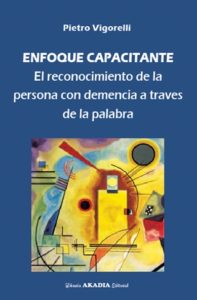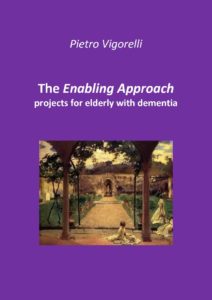In geriatrics the Enabling Approach has been introduced in the care of persons with Alzheimer’s disease by Pietro Vigorelli. It consists of a professional intervention that seeks to create an enabling environment in the location where frail elderly people live, with or without dementia.
In this environment they can exercise their Basic Abilities , especially the Speech Ability, as they are able to do – as they actually do – without feeling in error, and with the only aim of being happy in doing what they are doing.
The goal is to create the conditions for a Happy-enough Coexistence between elderly people, operators and family members.
(Translation by Jeannine Lemaire)
Bibliography
- Vigorelli P. The Enabling Approach, an Italian Approach to Persons Living with Dementia , Brain Science and Neurosurgery vol1(1) Brain Science and Neurosurgery (BSAN) DOI: 10.1875 bsan.2024/001
- Benvenuti, N., Bolioli, A., Bosca, A., Mazzei, A., & Vigorelli, P. (2021). The “Corpus Anchise 320” and the analysis of conversations between healthcare workers and people with dementia. In Dell’Orletta, F., Monti, J., & Tamburini, F. (Eds.), Proceedings of the Seventh Italian Conference on Computational Linguistics CLiC-it 2020 : Bologna, Italy, March 1-3, 2021. Torino : Accademia University Press. doi :10.4000/books.aaccademia.8260, 51-57
- Vigorelli P. The Enabling Approach. Projects for elderly with dementia. Youcanprint 2019. book/ebook.
- Alessandro Lanzoni, Andrea Fabbo, Donatella Basso, Patrizia Pedrazzini, Elena Bortolomiol, Marc Jones, Omar Cauli. Interventions aimed to increase independence and well-being in patients with Alzheimer’s disease. Review of some interventions in the Italian context. Neurology, Psychiatry and Brain Research. Volume 30, 2018, Pages 137-143, ISSN 0941-9500.
- Vigorelli P. The ABC Group for caregivers of persons living with dementia: self-help based on the Conversational and Enabling Approach. Non-pharmacological therapies in dementia. 2010; 3: 271-286. Free download.
- Ullo A., Oteri S., Cannavo D., Aguglia E., Larcan R. I “12 Passi” della “vittima nascosta” per la cura delle parole nella malattia di Alzheimer. 11th Congress of World Association for Psychosocial Rehabilitation (WAPR). Milano, 10-13 novembre 2012. Atti pag 306.
- Vigorelli P.: Enabling Approach in Museum Projects for persons with dementia . With many voices. Museum projects for peple with Alzheimer’s and their caregivers. Key lecture 29 novembre 2012. Palazzo Strozzi, Florence.
Links
- Alzheimer’s Disease International (ADI: international federation of Alzheimer associations around the world)
- Alzheimer’s Association (USA)
- Alzheimer-Europe
- Psychogeriatric Association
- American Academy of Neurology
- American Psychiatric Association
- American Association for Geriatric Psychiatry
- Reality Orientation Therapy
- Client-centered therapy (Carl R. Rogers)
- Validation Therapy (Naomi Feil)
- Reminiscence Therapy
- Bradford Dementia Group – GB
- SPECAL Approach: Specialized Early Care for Alzheimer’s (UK)
- GENTLECARE Prosthetic Life Care System (Moyra Jones, Canada)
- CST: Cognitive Stimulation Therapy (Aimee Spector, GB)
- The Savvy Caregiver Program (University of Minnesota, USA)
- The mith of Alzheimers (P.J.Whitehouse, Cleveland, USA)
- Neuropsychologie Cognitive (Martial Van Der Linden, Genève, CH)
- Eden Alternative (William Thomas, New York, USA)
- AA – Alcoholics Anonymous
- Al – Anon
- Centre on Age and Community (Anne Basting – University of Wisconsin, Milwaukee)
Video
1. Enabling Approach (1:9)
2. Origin and method (1:21)
3. Basic Abilities (1:52)
4. Key concepts (1:52)
5. Recognition of Basic Abilities (1:03)
6. Tools and settings (2:34)




